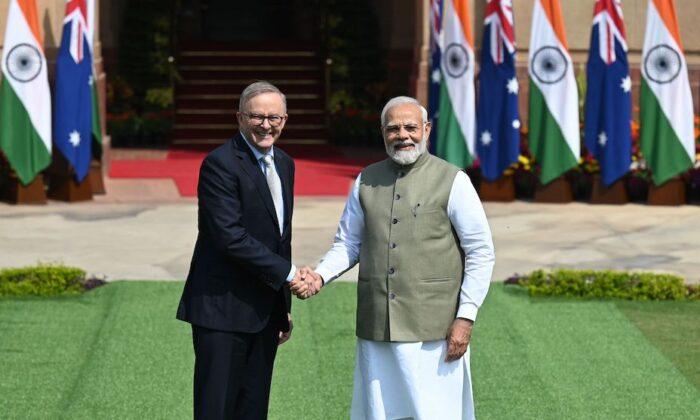Australia and India have jointly called for a peaceful resolution to territorial disputes and rejected the use of force in the South China Sea, where Beijing has been assertively pursuing its claims.
The two leaders emphasized that any code of conduct in the South China Sea must be “effective” and fully consistent with the legitimate rights of any state, including those that are not parties to the territorial disputes.
“The prime ministers underlined the importance of being able to exercise rights and freedoms in all seas and oceans consistent with international law, particularly the UN Convention on the Law of the Sea (UNCLOS), including freedom of navigation and overflight,” the statement reads.
Director of the Indonesian Foreign Ministry Sidharto Suryodipuro said on Sunday that his nation and other ASEAN members demand an “effective, substantive, and actionable” code of conduct for the South China Sea.
The code of conduct aims to maintain stability in the South China Sea. Brunei, Malaysia, Vietnam, and the Philippines have competing claims with Beijing, which claims almost all of it based on its “nine-dash line.”
Indonesia does not regard itself as a party to the dispute, but Beijing claims sovereignty over parts of the sea that overlap Indonesia’s exclusive economic zone.
Beijing has been assertively enforcing its territorial claims in the South China Sea by deploying coast guard ships and imposing fishing bans, which has resulted in protests from other countries.
Australia–India Ties
Australia and India have pledged to deepen cooperation in defense and security to address shared challenges, and work toward an open and prosperous Indo-Pacific.“The prime ministers agreed that, as a practical step, India and Australia may continue to explore conduct of aircraft deployments from each other’s territories to build operational familiarity and enhance maritime domain awareness,” the statement reads.
“I am pleased to announce formally ... that later this year, Australia will host Exercise Malabar for the first time, and India will—also for the first time—participate in Australia’s Talisman Sabre exercise,” he told reporters.
India’s growing diplomatic relationship with the United States has been integral to the reshaping of the Australia–India relationship, according to Manoj Joshi, a distinguished fellow at New Delhi’s Observer Research Foundation.
This is in contrast to the relationship a few years back when India rejected the Australian Navy’s role in the Exercise Malabar military drill, which Australia was allowed to attend only as an observer.
Australia, India, the United States, and Japan are part of the Quadrilateral Security Dialogue (the Quad), which seeks to counter Beijing’s efforts to dominate the Indo-Pacific.
During a Quad geopolitical summit on March 3, diplomats of Japan, Australia, India, and the United States said Beijing had no reason to fear the Quad—as long as the communist regime “abides by” international rules.





